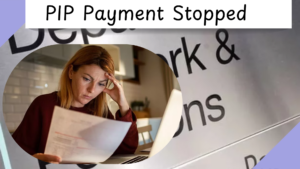For some reasons, the Department for Work and Pension could halt your personal independence payment. Since 2016, around 3.1 million PIPs claims have been reviewed, resulting in tens of thousands of people having their payments stopped or reduced. PIP is designed to cover the additional costs associated with long-term conditions or disability, offering up to 737 every four weeks, equivalent to roughly 9500 annually. Approximately 70,000 new claims are made for the benefit each month.
PIP Payments To Be Stopped by DWP
The DWP may stop or reduce a Personal Independence Payment (PIP) for several reasons including such as –
If your PIP has stopped due to the end of your fixed-term award, there are two potential courses of action. If you didn’t receive a review form for your claim but still have medical issues, it’s crucial to submit a new PIP claim immediately. However, if you did receive and return a form but haven’t heard back, get in touch with the DWP to confirm they received your form and inquire about their decision timeline. If you failed to return the review form within the given timeframe, ring the PIP helpline at 0800 121 4433 and request an extension to complete and return it. If the DWP denies this request, you’ll need to initiate a new claim from the beginning.
If you had a medical assessment – You can also request a mandatory reconsideration if the DWP determines your health has improved and decides to reduce or stop your PIP payments. If you believe your condition hasn’t improved, ask your GP or specialist letter and attach it to your paperwork when explaining why the decision was incorrect.

You have reached the end of your fixed term PIP Award- You can also contest to terminate your PIP if you believe you had a valid reason for not returning your form before the deadline, such as illness or home emergency. You must request this mandatory reconsideration of the decision on your claim within one month. However, citizen advice suggests that it’s still worth asking even if it’s within 13 months of the decision, provided you can justify your late response.
If you missed a medical assessment- If you miss a medical assessment, you can request DWP to schedule another one. If they agree or subsequently decide that you are still eligible for PIP, they will compensate you for any payments missed due to the halt.
The DWP is taking back a benefit overpayment- If you have been paid too much benefit, the government will usually reduce your future benefits payments until you have repaid what you owe. You should get a letter explaining why they think you have been overpaid including a list of reasons. If you haven’t been told why you can ask to be sent the reasons in writing.
You have been accused of benefit fraud – Your payment will stop while the DWP investigates, Citizens advised suggests finding a solicitor that can assist you during the investigation.
How much PIP rates increase in 2024?
On 8th April 2024, PIP increased by 6.7 %, which is in line with inflation. This 6.7 % increased was applied to most DWP and HMRC benefits –
Following weekly increases in PIP rates –
- Enhanced daily living component- 6.80
- Standard daily living component- 4.55
- Standard mobility component – 1.80
- Enhanced mobility component – 4.75
The new PIP rates mean you could get between 28 or 184.30 a week, between 114.80 and 737.20 every four weeks and between 1492.40 and 9583.60 a year.
How much PIP rates will increase in 2025
PIP rates have been confirmed to increased by a further 1.7 % in April 2025. This mean that from the 7th April 2025, the elements and the rates of PIP will increase to the following amounts –
Enhanced daily living component- 110.40 per week (up from 108.55)
Standard daily living component – 73.90 per week (up from 72.65)
Enhanced mobility component – 77.05 per week (up from 75.75)
Standard mobility component – 29.20 per week (up from 28.70)

Vishal is an education finance expert and advisor specializing in scholarships and financial literacy. With 15+ years’ experience, she guides students in making informed, strategic decisions to achieve academic funding success.

